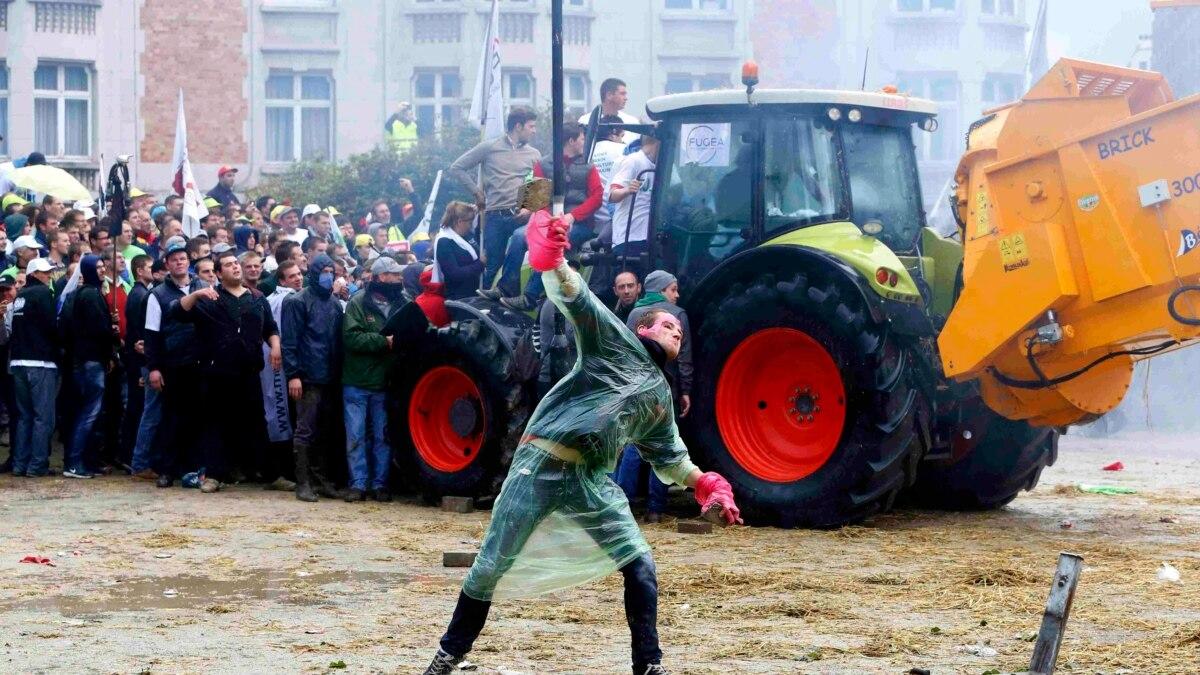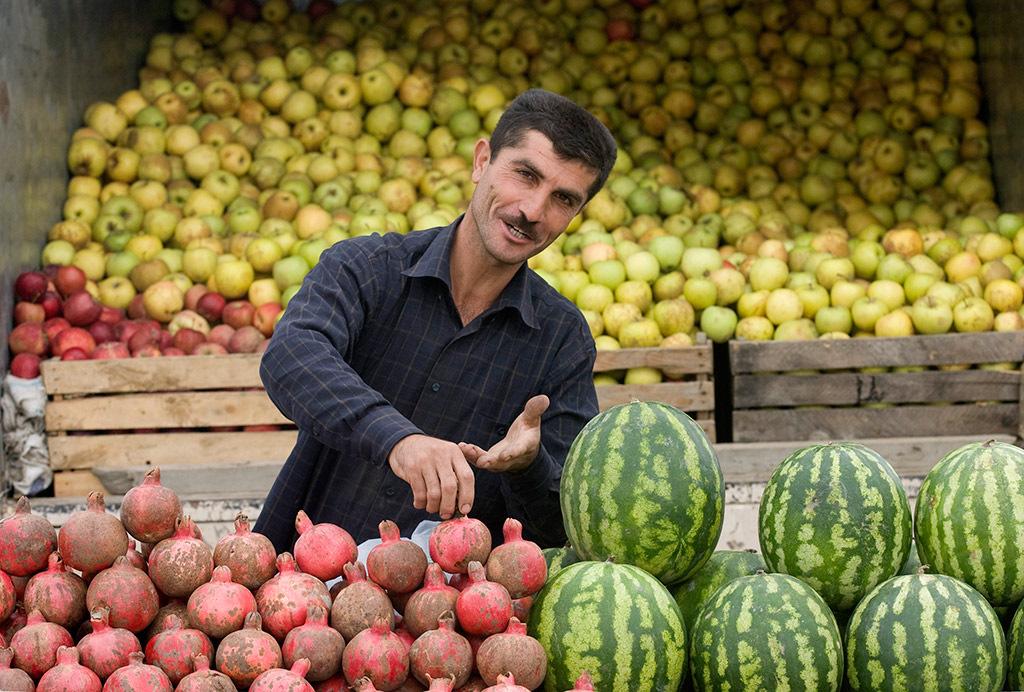EU farmers' revolt threatens agrarian globalisation Possible implications for Azerbaijan
February 2024 will be remembered for the unprecedented scale and geography of protests by European farmers opposing the agricultural policy pursued in the European Union (EU).
The stumbling block was the import of grain and other products from Ukraine, among the claims are the low level of subsidies for agriculture, high taxes and rising fuel prices. Farmers also express dissatisfaction with the "green course" of Brussels, which increases production costs. The current negative situation in the EU is only the beginning of the processes of deglobalization of the agricultural sector, segmentation of the food market into local regional clusters with strict customs barriers. All this is fraught with a decrease in supply and an inevitable increase in food prices, and with the strengthening of these trends, it is necessary to accelerate import substitution in Azerbaijan.
Problems with Ukrainian grain and other agricultural products entering the EU in huge quantities were observed already at the end of 2022, and since April last year, the governments of Poland, Hungary, Bulgaria, Romania and Slovakia have asked the European Commission (EC) to limit the volume of Ukrainian grain and 18 types of products, including milk, eggs, vegetables, meat, oilseeds, sugar, bee products.
However, it was not possible to protect the EU's domestic agricultural market from dumping, and despite attempts to unilaterally block agricultural supplies from Ukraine, under pressure from EC officials calling for political solidarity with Kyiv, Eastern European countries were forced to agree to transit Ukrainian food under strict control in sealed wagons with GPS modules.
These compromise agreements expired at the beginning of 2024, and since February, not only in Eastern European countries but also in the largest EU states, a real uprising of farmers began, calling on the EC to impose an embargo on Ukrainian dumping and sharply increase agricultural subsidies for their own farmers.
The scale of the ongoing processes and the extreme dissatisfaction of European farmers with the current agricultural policy of the EC are evidenced by recent events in France, Poland, the Czech Republic, Slovakia, Hungary, Spain and Bulgaria, where mass multi-day demonstrations of farmers and trade unions with blocking roads and marches on agricultural machinery to the capitals took place. In France, farmers' protests turned into a real battle with the police and gendarmerie during a visit to the Paris International Agricultural Forum by President Emmanuel Macron, as a result of which eight French law enforcement officers were seriously injured.

Polish farmers who continue to block the S3 road are no less heated, and this protest will last until 20 March: even along with the closure of the border with Ukraine, Polish farmers are threatening to block the border with Germany and strike around the clock. The Czech Republic is also protesting against the government's agricultural policy, where more than 500 tractors arrived in Prague the other day, with more equipment and farmers on their way.
In early February, at least 80 motorways in Bulgaria were blocked by heavy agricultural machinery. Mass protests against the agricultural policy of the EC and politicians in Brussels also took place in the streets of Madrid, Budapest, Bratislava with the participation of thousands of farmers and many hundreds of tractors blocking the administrative centres of these capitals.
"The European Commission demonstrates a complete lack of interest in protecting both Slovak and other European farmers - it is blind and deaf. We must respond to this with Slovakia's sovereign foreign policy and a ban on imports of several agricultural products from Ukraine," Slovak Prime Minister Robert Fitzo formulated the essence of European farmers' discontent in this way. - Agricultural products from Ukraine are imported to the EU market without any duties and quotas - from grain to poultry meat, eggs and honey, of course, this is detrimental to our farmers".
In addition to Ukrainian food dumping, European agrarians are dissatisfied with high taxes in the EU and excessive bureaucracy in obtaining subsidies, the small amount of these subsidies, as well as rising prices for fuel, fertilisers, machinery, etc.
Farmers are also extremely dissatisfied with the EU's "green course", which provides for the achievement of climate neutrality by member states by 2050, which is why the EC's policy is aimed everywhere at introducing methods of "sustainable agriculture" (mass use of renewable energy sources, gentle land use, tougher measures against environmental pollution, abandonment of agricultural chemistry, etc. D.), which is often incompatible with the practice of intensive agricultural production.
Judging by the scale of the protests and the discontent of EU farmers, this time the bureaucracy in Brussels will not be able to ignore their demands. This is indirectly evidenced by the recent promises of French President Emmanuel Macron to protect the country's farmers from dumping of imported products coming from outside the EU: "We cannot let our market collapse because of excessive imports, this is a danger zone. Macron said the food sovereignty bill, which will be submitted to the republic's government on 20 March, will designate agriculture and food security as the main common interest of the French nation.

Similar decisions are being prepared in several other European countries, which means a gradual abandonment of the globalisation policy with its principles of open markets and free competition in favour of closed regional markets with strict regulation of imports. This trend also provides for an increase in subsidies and other assistance to their agrarians, which, in turn, will lead to higher prices for food and technical crops. As a rule, such steps do not pass without trace, and as a result of the "domino principle" cause retaliation in other regions of the world, accelerating the process of market closure within local regional economic unions.
To what extent can the expected future trends in the EU agricultural sector affect Azerbaijan's food security? According to the data of the State Customs Committee of the Republic of Azerbaijan, last year food imports to Azerbaijan decreased by 8.6 per cent, totalling $2.16 billion: the biggest reduction in price terms was observed in the supplies of wheat, as well as oils and fats of vegetable and animal origin. However, it is not about the reduction of physical volumes of food imports to our country, but about the decline in prices on the world market. According to the UN Food and Agriculture Organisation (FAO), the food price index for 2023 decreased by 13.7 per cent, which is due to a set of global anti-inflationary measures.
Thus, it can be argued that Azerbaijan's dependence on external food supplies is still quite high: although the main imports come from Russia and other post-Soviet countries, as well as Turkey and Iran, the share of EU countries in food trade is still quite significant. It should be remembered that high inflation and the food crisis of 2022-2023 revealed several serious sectoral problems in our country as well. Azerbaijan's crop farms are still heavily dependent on imports of elite seeds, pesticides, phosphate and many other fertilisers, while livestock complexes and poultry farms are largely oriented to the supply of fodder, vitamins, vaccines and other products and preparations used in the industry from abroad. To a large extent, all these products are imported from the European Union, and the expected future rise in prices for these goods will have an extremely negative impact on Azerbaijani farmers, processors and food enterprises.
In recent years, Azerbaijan has taken some steps to expand import substitution, but the effectiveness of these steps is still very low: for many years in a row, the rate of development of domestic agriculture has not been able to overcome the three per cent threshold. Thus, according to the State Statistics Committee, in 2023 the country will produce agricultural products worth just over 12.21 billion manats ($7.18 billion), again with growth of 3 per cent, with the livestock sector being the driver of development, with growth of 3.2 per cent.
Thus, except for cereal production, which grew by 2.8 per cent, there is a decline in many basic sectors: cotton production fell by 14.4 per cent, melons by 6.6 per cent, potatoes by 5.9 per cent (the country's markets sell mainly Belarusian and Iranian potatoes), sugar beet harvested by 1.3 per cent and sunflower by 0.2 per cent. Things are not much better in the current year, in particular, in January 2024, agricultural production totalled 491.2 million manats ($289 million), with an increase of only 1.2 per cent. Of course, the winter month of January is not indicative of the sectoral development, as the main harvest falls on summer and autumn.
However, the fact that agriculture, forestry and fish farming (where about 40 per cent of the country's population is employed) accounted for only 5.5 per cent of the country's GDP in 2023 is evidence of a lot. The only way to reliably overcome dependence on imports of food, components and medicines is to accelerate the localisation of enterprises producing products necessary for the agro-industrial complex and food industry in Azerbaijan, as well as introduction of intensive farming technologies and systems of economical irrigation, digitalisation of the industry. This has long been called for by FAO experts, who recommend reducing external dependence on food supplies.

"Azerbaijan is among the 20 countries in the world that suffer most from water scarcity: in the country, about 70 per cent of fresh water is used in agriculture," noted M.N. Hayat, Head of FAO's Partnership and Coordination Office in Azerbaijan not long ago, emphasising that a key challenge for the country's agricultural sector is to reduce losses in water canals through the introduction of modern insulation technologies and economical irrigation systems in fields.
Alas, the domestic agro-industry still faces long-standing problems: low productivity in smallholder farms, which have difficulties in attracting financing and access to modern agricultural technologies, and therefore lose out on profitability of production. This ultimately increases the cost of production, depriving local products of competitive advantages in domestic and foreign markets. Azerbaijan still has to make a lot of efforts to increase the volume of agricultural production, reducing costs, increasing the share of packaged and processed agricultural products, ensuring a tangible increase in added value in production.








